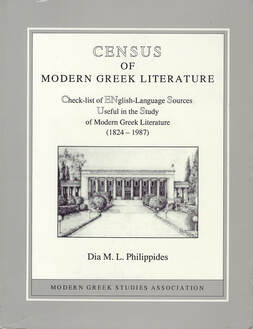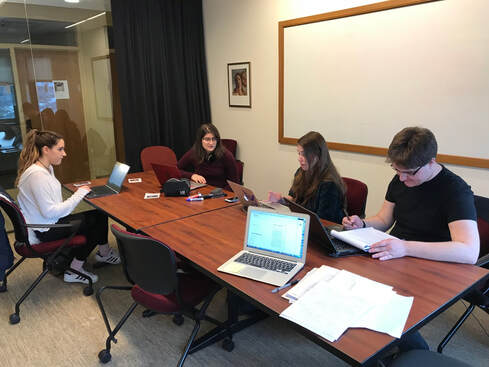THE CENSUS OF MODERN GREEK LITERATURE
IN THE ENGLISH-SPEAKING WORLD
At the first online presentation (Tuesday, 5 April, 2022) the new CENSUS site was launched. The "Greek AUTHORS 19th-21st centuries" section is now open to users
(moderngreekliterature.org)
Notice (of the presentation) in the Kathimerini newspaper - English version (April 1, 2022)
The CENSUS (= Checklist of ENglish-Language Sources Useful in the Study of Modern Greek Literature) facilitates access to modern Greek literature for speakers of English, by providing references to all the English-language translations of modern Greek literature and to all the critical studies in English that relate to modern Greek literature from the twelfth century AD to the present (a span of ca. 9 centuries!), published anywhere in the world. The CENSUS collection includes references both to works published in full book-form and to items published within volumes, such as shorter literary pieces and articles usually 'hidden' within larger collective works. The current range of discovered references (all in English) extends — by their dates of publication — from AD 1813 to today.
|
The CENSUS project currently aims at publishing a second, expanded edition of the original monograph published in 1990: Dia M. L. Philippides, Check-list of ENglish-Language Sources Useful in the Study of Modern Greek Literature (1824-1987). New Haven, CT: Modern Greek Studies Association, 1990. xxviii, 248 p. Second printing 1992. ISBN 0912105011; 9780912105017. |
The new edition of the CENSUS will be made available online, published under Open Access, in machine-readable format that will be searchable and extensible. We aim at publishing both a book in print (including references up through 2012) and a fully searchable and extensible database (including references up to 'today'). We also anticipate a future online posting of the book's text in digital format (as an indexed pdf).
The CENSUS looks forward to releasing its first new results in the near future (early 2022), as part of the celebration of Greece's two-hundreth anniversary (2021) since the Greek Revolution of 1821.
An important unique feature of the CENSUS is that it fully indexes the contents of large collective volumes such as anthologies (in greater detail than in any other available source), thus facilitating detailed searches (both simple and complex) and precise retrieval. Special attention is given to identifying all personal names (by authority form and variant spellings) and to tagging them by function [e.g., creative author, translator, editor, etc.). Online sources are also recorded. Linked data connects the CENSUS's collection with other standard databases and leads the reader directly to online sources for immediate reading.
Sections to be included — in the print volume and online — are:
1. Bibliographical sources;
2. Anthologies;
3. Literary History (including early modern Greek literature, 12th-18th centuries AD);
4. Authors (A-Z), 19th-21st centuries.
At present our collection encompasses ca. 1,250 pages. and more than 7,500 entries/records.
The full electronic indexing to be provided by the custom-designed database will enable users to track and visualize (overall and in detail) the trends and patterns of Modern Greek literature throughout the English-speaking world by geographic locations, time, contributing person names and functions, literary genres, etc. The resulting new observations are likely to influence the future translation and scholarly studies of Modern Greek literature in English.
This bibliographic collection hopes to function as a standard work of reference: for students, faculty, translators, publishers, libraries, scholars and general readers everywhere in the English-speaking world who might be interested in the contemporary literature of Greece.
For a brief introduction to the CENSUS project, you are invited to view the brief video (4:05 mins.) "CENSUS of Modern Greek Literature: A Snapshot (2018)", directed by Angelos Bougas (BC '21).
Collaborators on the CENSUS project — currently and recently — include:
Dia Philippides, Professor Emerita, Dept. of Classical Studies, Boston College
Wim F. Bakker, Professor Emeritus of Byzantine and Modern Greek Language and Literature, University of Amsterdam
Ben Florin, Senior Library Applications Developer - Library Applications, O'Neill Library, Boston College
Peter Klapes (BC ’19 [B.A.] and '22 [M.A.]), research assistant (2015-2020); project manager (2021- )
Michaela Iatrou, special philological researcher, Athens
Alfred Vincent, Honorary Associate, University of Sydney
Anna Kijas (2016-2018), Senior Digital Scholarship Librarian, O'Neill Library, Boston College
Jesse Martinez (2018), Library Applications Developer, O'Neill Library, Boston College
Nancy Adams (2016), Digital Publishing Assistant - Scholarly Communication, O'Neill Library, Boston College
Other colleagues in the Boston College Libraries
A workshop of Boston College undergraduates (Winter and Spring 2018): Angelos Bougas, Peter Klapes, Eleni Krupinski, Marry Ann Orfanos, Violet Papathanasiou, Irene Sahinidis -- photograph below
Many colleagues at Boston College and elsewhere have been generous with their offers of information, expertise, and advice.
The CENSUS project began at Harvard University (1981-1985) and continued its development at Boston College (1986-2018). An early presentation of its results (to date) was given at the Modern Greek Studies Association's conference (cf. pp. 31-32) held at Princeton University in April 1984. Strong links with the Modern Greek Studies Association, and especially the actions of its Executive Director John O. Iatrides, led to the publication of Dia Philippides' 1990 CENSUS monograph and to related agreements with the Gennadius Library of the American School of Classical Studies and the National Book Centre of Greece (ΕΚΕΒΙ). A collaborative project also linked the CENSUS's principal investigators with the Centre for the Greek Language (ΚΕΓ). During the years 2016-2018 the CENSUS benefitted from its adoption as an 'approved' project by the Boston College Libraries, with the Digital Scholarship Group and Library Systems developing the foundations for its online presence.
At this point the (international) team of the CENSUS is open to new collaborations and partnerships for its next stages.
As of 2020 the CENSUS' has initiated a new collaboration with the Marilena Laskaridis Chair of Modern Greek Studies at the University of Amsterdam, supported by the Aikaterini Laskaridis Foundation. For more information see "News and Events".
The CENSUS is one of the ca. 130 international research projects connected with the celebration of the Greek Bicentennial (1821-2021), under the initiative 'Πρωτοβουλία 1821-2021'. See "Media".
Endorsement: The CENSUS is very pleased to have received the endorsement of the Modern Greek Studies Association.
SPONSORS of the CENSUS:
The CENSUS project is grateful for the the generous support it receives from institutions, foundations, and individual donors.
Major sponsors of the CENSUS (1998-present) include:
The CENSUS project began at Harvard University (1981-1985) and continued its development at Boston College (1986-2018). An early presentation of its results (to date) was given at the Modern Greek Studies Association's conference (cf. pp. 31-32) held at Princeton University in April 1984. Strong links with the Modern Greek Studies Association, and especially the actions of its Executive Director John O. Iatrides, led to the publication of Dia Philippides' 1990 CENSUS monograph and to related agreements with the Gennadius Library of the American School of Classical Studies and the National Book Centre of Greece (ΕΚΕΒΙ). A collaborative project also linked the CENSUS's principal investigators with the Centre for the Greek Language (ΚΕΓ). During the years 2016-2018 the CENSUS benefitted from its adoption as an 'approved' project by the Boston College Libraries, with the Digital Scholarship Group and Library Systems developing the foundations for its online presence.
At this point the (international) team of the CENSUS is open to new collaborations and partnerships for its next stages.
As of 2020 the CENSUS' has initiated a new collaboration with the Marilena Laskaridis Chair of Modern Greek Studies at the University of Amsterdam, supported by the Aikaterini Laskaridis Foundation. For more information see "News and Events".
The CENSUS is one of the ca. 130 international research projects connected with the celebration of the Greek Bicentennial (1821-2021), under the initiative 'Πρωτοβουλία 1821-2021'. See "Media".
Endorsement: The CENSUS is very pleased to have received the endorsement of the Modern Greek Studies Association.
SPONSORS of the CENSUS:
The CENSUS project is grateful for the the generous support it receives from institutions, foundations, and individual donors.
Major sponsors of the CENSUS (1998-present) include:
|
Hellenic Republic: Ministry of Culture and Tourism (Direction of International Relations)
Alexander S. Onassis Public Benefit Foundation Costas and Mary Maliotis Charitable Foundation Petros Haris Foundation Aikaterini Laskaridis Foundation Daphne and George Hatsopoulos Drake Behrakis Dave Krupinski and Katerina Paraskevopoulou Collaboration from: Boston College Libraries Boston College: Provost’s Office, Dean’s Office (Arts and Sciences), and the Department of Classical Studies |
|
CONTACT:
You may contact the compilers of the CENSUS at Dia dot Philippides at bc dot edu |
|
_________________________
For permission to include the image of the Gennadius Library on our site we thank the Director, Maria Georgopoulou. The library's inscription, "ΕΛΛΗΝΕΣ ΚΑΛΟΥΝΤΑΙ ΟΙ ΤΗΣ ΠΑΙΔΕΥΣΕΩΣ ΤΗΣ ΗΜΕΤΕΡΑΣ ΜΕΤΕΧΟΝΤΕΣ", we are reading as “The name of ‘Greeks’ is given to [all] those who share our culture.” |
Proudly powered by Weebly

